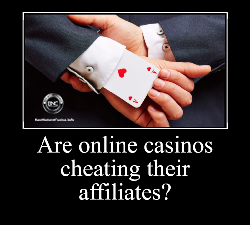Updated: December 22, 2023
With this feature, we would like to give our input on the topic of the two-fold relationship between casinos and affiliates: is there an honest partnership and who are the false bottom examples, are casinos cheat their affiliates? However, before we actually begin delving if double-dealing is a real problem that transpires in the gambling world between these two partakers or not, let’s just briefly define the terms we will use in this article.





Casino affiliate programs are projects often appointed by a gambling website. They require working in an alliance (signed with a contract/Terms & Conditions) between the two parties: a Canadian online casino, which needs promotions to attract customers, and an affiliate, which essentially originates from and subsists to promote that site.
Casino affiliates are the project leader and his team of employees who are sending new players to a gambling site via one affiliate program. They get paid a commission for each player who visits the casino site or becomes a depositing player through a unique affiliate tracking link.
With special software, all the program links will trail the activity of the players, including their account registration (bonuses for registration).
The data collected by the casinos is the metric detail used to determine the deposits, bonus costs, and revenue generated by each customer. This same data, plus the contractual agreement made at the beginning of the project, dictates what commission the partner will receive.
Here comes the help – for digesting and utilizing the collected data – there is a special affiliate software, which is designed to digitally facilitate the tracing process, saving time by automating commissions, monitoring, analyzing, reporting, making everything more visible, hence improving the relationship Canadian betting website-affiliate and boosting both parties profits. Do you want to play at online casinos with no verification withdrawal?
 It is always astonishing to hear how some casinos are weaselling out of paying their affiliates a fair commission. This is because they are failing to understand the most fundamental facet of affiliate marketing…
It is always astonishing to hear how some casinos are weaselling out of paying their affiliates a fair commission. This is because they are failing to understand the most fundamental facet of affiliate marketing…
The more money their affiliates make, the more money these casinos make. Then why will one gaming site cheat on its partners? Simple – It is greedy!
While the relationship between the Canadian online casino and the player is padded with a lot of human work, hours, teams, legalizations, verification and commission bodies, and this way performs more structured, the relationship between the gambling website and its affiliates is somewhat chaotic and in disarray. Even the contracts and the T&C’s sections are not enough to create a universal and protective for both part’s environment.
Casinos believe they are in a power position because they are writing the check. But the truth is that one betting site can go from having thousands of players to zero overnight if there were no affiliates to work for it.
So, cheat their affiliates shows the particularly short-sited mechanisms of functioning of some casinos, never realizing that by scamming their partners, they de facto delude themselves.
If only they calculate the extra manpower and efforts they put into creating and executing the sham and compare that number with what they actually disagree on, they should see how silly and undoubtedly meaningless their actions were. Thus cheat affiliates is just cheating on themselves!
The casino manager/representative is thinking – if not with this partner – we can sign with the next guy, guess what? If he is not treated well, the affiliate will jump ship to the competitor – a gambling website in a blink of an eye! Moreover, he will take his real connections, digital links, followers, and friends with him.
The time can come when a “ME TOO” avalanche of tweaked affiliates can rapidly go down on this or that casino brand for being a greedy, massive cheater. Sure these dishonest Canadian online casinos cannot keep on operating unpunished forever.
Maybe it is time to obligate the casinos to make one partner register with the Gambling Commission (or other similar institution), with which they will be enforced/audited to abide by much stricter rules of responsibility to who their partners are, the length of the contract with them, how are they being paid, and how are the disputes going to be settled. Hereby our opinion: We stand for fully “legitimate” casino affiliate marketing.
(Please feel free to leave a comment under this article or write an email if you agree with our sentiments.)
Working with an partner program will give you 3 ways to arrange your payments:
However, there is the possibility of negative carrying over – because you see – when a player you have brought loses big – you WIN BIG, but when the player wins big, then you consequently LOSE BIG. This calculation shows how quickly you can arrive in a negative balance situation. Some programs wipe out this negative amount of the affiliate account monthly, but you must have it in the contract for that to happen!
As with every relationship between partners, here too, some disagreements can source rattles in the gambling’s cage. The usual disputes/ complaints/ disagreements are based on:
 Most Canadian online casinos have huge marketing resources allocated for affiliate programs. The honest and straightforward gambling sites will create a business long-term plan to appropriate on a legal way these affiliates’ funds. The partners then remain motivated and devoted to the program.
Most Canadian online casinos have huge marketing resources allocated for affiliate programs. The honest and straightforward gambling sites will create a business long-term plan to appropriate on a legal way these affiliates’ funds. The partners then remain motivated and devoted to the program.
But there are operators, who with the argument of protecting their brand name (fake?/truth? or reputational worries), or redirecting their project funds to other more suitable causes, or just not willing to pay any more commissions, are inventing “all-new marketing” strategy, that excludes this or that affiliate. So, in the beginning, they show you their good face, but in the future, you are risking being left with lower funds and even being dumped via simple T&C’s “bending” with a new set of requirements per “traffic.”
One unfair gambling site even blamed its high CHURM RATE on the affiliates instead of navigating its business plans to more effective results and marketing performance. Due to this, the casino dumped several long-term partners. (CHURM RATE- % of casino players, who for some reason leave the casino and never visit again)
So, one gambling operator can pressure the partner for stream hustle or, in the worst-case scenario, to cast that partner aside in this super rivalry market!
At this point, we need to clarify that the examples below are purely speculative (we do not have real evidence of them). However, they are highly indicative if one follows clean logic and a line of assumptions.
During one operational month, a casino (here we assume it is a white label Canadian gambling website) has its variable in size costs, which besides the affiliate commissions include the payment systems fees, the percentages for the game developers – royalty payments, jackpot fees, regulators taxes, etc. In addition, some online casinos above the named costs take an additional 20% to 30% from the amount of the player’s deposit as an admin fee.
The trouble here is the imposing of an admin fee, which:
Some affiliates complain about missing transparent reports with a detailed layout for the login or numbers of players. On their platforms, they see only the quantity of registrations, the number of new depositors (players who at the first time deposit to their account) and amounts already “clean” (that is, after deducting all admin fees).
Avoiding an ostensive way of displaying the numbers, the casinos may vary with the admin fee % as they go. Even with the constant tests and checkups on what and how much was actually deducted, the gambling operators always find some excuse of “mix-up/technical/mathematical” error, or temporarily adjusting the commission as originally agreed, till the time that the affiliate is checking. Then they reverse the percentage once again – intentionally reducing the affiliates’ money.
Canadian online casinos are trying to justify the high admin fee with the high payment method tolls imposed for all the transactions (deposits and withdrawals) by the payment operators (bank and other financial institutions). Some money wired is tolled (they say) with a 10-12 % fee of the amount. Some other payment companies (Skrill and Neteller) charge about 4%, third ones – Visa and MasterCard – between 3 and 5%.
Interestingly, if the admin fee is set at 35%, that will also be spread to all amounts, including the „cheap options” (Skrill, Neteller, and cards).
“Shaving” statistical reports’ (also known as“players shaving”) of affiliates can be a serious deceit problem which refers to casinos’ attempt to deprive partners of their commissions. This type of scam is possible only for Rev sharing and Lifetime arrangements, where the affiliates are alleged to profit continuingly. Thus, the casinos are practically “shaving” their budget expenses of sums they were supposed to pay to affiliates.
The scenario of this scam goes as follows:
The “shaving” itself can be performed in various ways:
The managers also can impose the following 2 radical methods:
If they use such practice operating with partners, they surely don’t stop with one affiliate – they are massively cheating! Some affiliates signalized that while the player is being “shaved” from his platform, that player’s money is vanishing from all previous periods as well. So, that means the partner can filter the numbers for the past months if some player is “disappearing” and periodically check if the casino is messing with the stats.
Commonly, online casinos incline to disconnect large and medium players with big and average bets. The easiest way to execute this is after a pause in the game, cause at this moment, it is less probable to catch the partner’s attention. Sure the Canadian online casino can argue again that it was a technical failure.
They often try to disconnect players who are not indirectly associated with a partner. What do you think about a gambling website that asks you to fill out an extensive query (country and address of residence) while registering?
West European online casinos introduced this practice as license compliance rule. Their method was based on the logic that as less the player and the affiliate are connected with each other, as higher the likelihood that they will not suspect the disconnection and the casino will very inconspicuously release the partner from the burden of getting a profit for that player.
Suppose the affiliate is not inquisitive, observant, and willing to regularly test the casino’s appetite for “shaving” one or more players grow. Moreover, the larger the affiliate program and the more players register and play, the easier the betting site can “shave off “any of them.
It is well known if a person at least once went to the online casino site via an affiliate link, then the player’s tracking code will be preserved in the cookies. Thus, regardless of whether the player registers an account immediately after the transition or after a few days – if he did not clean his browser history (in particular the cookies section), then the code will be fastened securely under the partner.
One large and respected betting website was caught up running operations some years ago while their cookies did not work. If a person erased the tail and remainder of an affiliate link or did not immediately click on the register button, he was involved as a direct player without binding to the affiliate.
The managers of this Canadian online casino, being owners of a large poker site for many years already, having had relationships/partnerships/contracts with multiple partners for a long period – assumed that they did not know anything or did not understand that the cookies are not functioning – it sounds silly – the least.
One of the affiliates noticed this fraud, and after verification, it uncovered the whole massiveness of the situation. After disabling the tracking cookies for several years was discovered that 90% of the players that this gambling site received as partners actually referred to direct players.
But they were robbed from them, i.e. this casino did not share profits with them. After presenting the claims results, the gaming site ascribed this misfortune to a technical failure in the system, and then they had no other choice but to activate the cookies files again.
This is one simple but, if well-executed, very effective casino “marketing” technique similar to the widely popular bank “phishing” scam. It first began in Western Europe as a sending email system, claiming to be from a reputable firm to convince some individuals to reveal their personal information, such as passwords and credit card numbers.
With casinos, the crooked “marketing deal” looks like this:
 Phase 1 – Open not one but 2 casinos.
Phase 1 – Open not one but 2 casinos.From the player’s point of view – it is not a big deal – you registered in one betting website, entered your e-mail, phone number and other private preferences – some mass-mailing spam is launched, followed by calling and sending SMS messages. But you remain a member of the second casino – with better deals, just without partners.